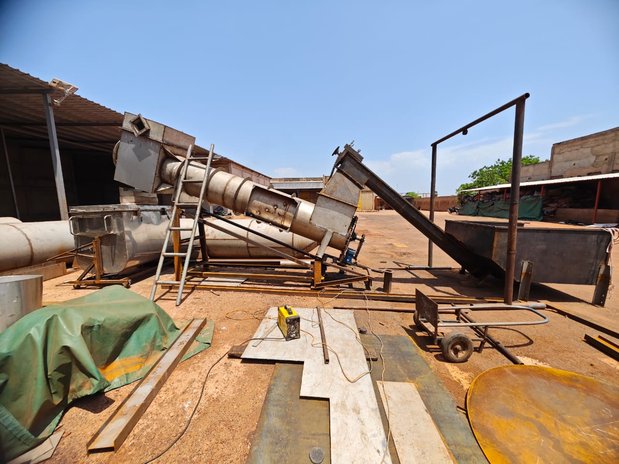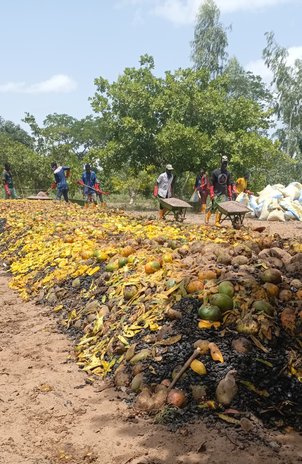Circular economy at our factory in Burkina Faso
Cracking cashews and drying mangos produces a lot of organic waste. This waste is valuable. That's why we have fully integrated it into our factory's cycle.
Our new factory in Burkina Faso brings many changes for us: More employees, no more manual cracking, and unbelievable quantities of cashews. When our production reaches full capacity, we will be producing 2,000 tonnes of cashews per year.
This in turn will generate approximately 8,000 tonnes of waste, because a freshly harvested cashews weigh five times as much as the ready-to-eat kernels. Most of this weight is in the shell.
So what can we do with this waste? Well, the good news is that cashew shells can be reused. The simplest method is to burn them to fuel a boiler, which then produces steam and hot water. Both are necessary for processing the cashews: Before you can crack them, you have to dry them, steam them and dry them again. This makes the shell brittle and easier to remove.
Cashew shells are more environmentally friendly than gas
Firing the boiler with cashew shells is less harmful to the environment than using gas, for example. This is because the volume of CO2 released during the combustion of the shells was previously absorbed from the atmosphere by the cashew tree and stored in the shells. But it gets even better: The shells can be burned in a pyrolytic oven, which also generates heat for the boiler. They also produce biochar and other by-products which can be reused. One example is the oil contained in the shells, known in technical terms as cashew nutshell liquid, or CNSL for short.
CNSL is a sought-after raw material in the industry. It is found in resins, varnishes, paints and coatings, in brake and clutch linings, is used in the manufacture of polymers and can be used to produce biofuels.
The government supports us financially
That is why we are relying on pyrolysis in our new factory. With financial support from the Swiss Renewable Energy Platform (Repic), an interdepartmental platform of the Federal Offices SECO, SDC, FOEN and SFOE, we have developed a system for this very purpose. We are receiving support from Swiss engineer Martin Schmid, whose company Generation Carbon has already implemented similar systems. He also provided the expertise necessary to have the plant manufactured by local mechanical engineers in Burkina Faso.
However, CNSL is more of a side area for us. Our main interest is in biochar. To understand this interest, we need to look at the second crop processed in our factory: Mangos.
In the new factory, we will not only crack cashews, but also dry fresh mangos. This also generates an enormous amount of organic waste and unlike cashew shells, however, mango skins have little value. At least not in their original form.
Mango waste and biochar are used to produce fertiliser
By composting this waste, we are changing this situation. This is where biochar comes into play again. We mix it into the compost and end up with a charcoal-soil mixture that contains many nutrients, stores water like a sponge and can permanently bind CO2 in the subsoil.
We will sell this enriched compost soil at the lowest possible price to family farmers in six villages near the factory. There is also talk of offering them to local vegetable producers. The aim is to help producers increase their yields and improve soil health.
Permanently binding CO2 in the soil also gives us the opportunity to cover the costs of all this by issuing and selling CO2 certificates with the help of the Swiss organisation First Climate.
These certificates are highly controversial. But in this case, they are our only chance of making compost affordable for farming families while also recycling our production waste.

Construction of the pyrolytic oven at a local machine manufacturer.

Test setup for composting, including enrichment with biochar from pyrolysis. Once it’s up and running, the composting plant will have a concrete floor and a solid roof.
Target by 2034
Once the new factory is up and running, we want to gradually ramp up pyrolysis, composting and the issuance of certificates to ensure its feasibility. If it works, we expect to be able to recycle 710 tonnes of biochar a year as of 2034. This equates to 1,791 carbon credits (1 credit equals 1 tonne of CO2 equivalents or one certificate). For the sale of the certificates, we have created an exclusion list to monitor which companies are eligible for the purchase our certificates and which are not.
Sources used
Wikipedia article on the cashew tree, https://en.wikipedia.org/wiki/Cashew (accessed on 12.08.2025)
Wikipedia article on pyrolysis, https://en.wikipedia.org/wiki/Pyrolysis (accessed on 12.08.2025)
Wikipedia article on biomass heating system, https://en.wikipedia.org/wiki/Biomass_heating_system (accessed on 12.08.2025)
Certificate exclusion list
Companies that meet one or more of the following criteria are not eligible to purchase our certificates:
- Manufacture, sale or distribution of ammunition and/or weapons or their components, including military equipment and accessories.
- Manufacture, sale or distribution of tobacco or tobacco products.
- Participation in the production, sale and distribution of pornography.
- Manufacture, sale or distribution of wild animals as well as substances subject to international bans or phase-out regulations.
- Large-scale industrial agriculture, gas/oil extraction and mining.
- Gambling, including casinos, betting, etc. (except lotteries for charitable causes).
- Violation of human rights or aiding and abetting human rights violation.
- Use or tolerance of forced labour and disregard for labour rights and standards.
- Use or tolerance of child labour.
- Participation in unfair business practices.
- Large multinational industrial food and agricultural corporations.
- Manufacture, sale or distribution of genetically modified organisms (GMOs).
- Manufacture, sale or distribution of synthetic agrochemicals.
- Companies whose practices cause significant damage to the environment, biodiversity and natural resources.
- Companies that deal exclusively in commodity trading.

 Login
Login

